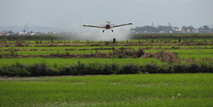Movements are marching against pesticides and the new Forest Code
 By Vinicius Mansur
By Vinicius Mansur
The "Permanent Campaign against Pesticides and Life" will be launched by the movements of rural workers and environmentalists on the World Health Day, Thursday, April 7, 2011.
According to the coordinator of the MST, Paola Pereira, acts will be launched in the main capitals of Brazil. In Brasilia, a march will pass by the Ministries of Health and Agriculture and by the Congress with the goal of making pesticides a public discussion.
"We believe it is important to make this debate in the community because the type of agriculture that is now being implemented in Brazil, by agribusiness, has made the country, since 2009, the world champion in the use of pesticides. This is dangerous for health. It affects the producers who handle pesticides inappropriately and consumers in the city that end up buying products with a high level of poison. So we will make the launch on the 7the day" he said.
According to Paolo, Brazil consumed approximately 1 billion gallons of pesticides in 2009 - an average of 5 liters per person.
The coordinator of the MST also stressed that the protest march was also against the project of congressman Aldo Rebelo (PCdoB-SP) to amend the Forestry Code. "Our campaign supports a new model for agriculture without pesticides and also makes possible zero deforestation. The design of this congressman is a disaster."
On the same Thursday in the House of Representatives, the Commission on Social Security and Family will have a public hearing on pesticides. The National Agency for Sanitary Surveillance (Anvisa), the National Pesticide Forum, the Movement of Small Farmers (MPA) and National Agriculture Confederation (CNA) are invited to expound on the subject.
In addition to the MST, the "Permanent Campaign against Pesticides and Life" consists of entities such as the Movement of People Affected by Dams (MAB), National Federation of Workers in Family Agriculture (Fetraf), Movement of Small Farmers (MPA), Movement of Rural Women (MMC), Socio-Environmental Institute (ISA), Greenpeace, SOS Mata Atlantica, Institute for Socioeconomic Studies (INESC).
